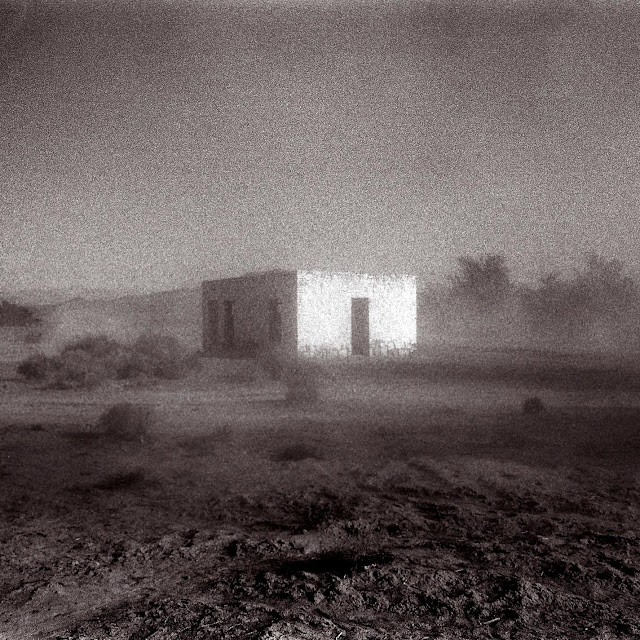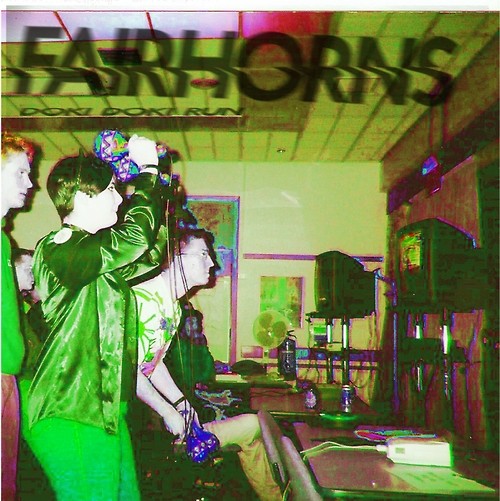
Hecker was elevated to a greater prominence with the release of Ravedeath, 1972 just last year, and shows since have witnessed the Montréal ambient overlord assume a bizarrely empyrean position. He's basically been fiddling with the organs of esteemed cathedrals, concealed from the scrutinising gaze of most, with his back to all. And it seems apposite, therefore, that Instrumental Tourist is an at first unassuming listen. Personified, it'd seemingly lose little sleep over a less discerning, though more general, and with that sizeable audience turning its collective back on its deep gurgles and rusted scrapes. For the Instrumental Tourist thrives on esotericism; on the uncharted nooks and unplumbed crannies lurking in the shadows of imposing monuments. Milan's San Bernardino alle Ossa as contrasted with the Duomo, ad esempio.
It's a metaphor that comes to mind quite naturally, and does so for an array of reasons. For the economic hub of the financially unsettled Italian Republic is itself a city of stark contrast: its historic centre – immaculately annular in shape – is veritably teeming with palpable artistic and historical residuum left over from Il Rinascimento, and yet beyond this inner ring of the city lies a grotesquely industrialised, and with that intensely barren hinterland of sorts. A gloomy nether zone best avoided. And Instrumental Tourist plays off this juxtaposition of light and dark; of comparatively antiquated traditionalism – classicism, almost – and a more ambiguous, and murky now. Similarly, given the precarious disarray the country finds itself within a Catholic context, Instrumental Tourist pricks the unstable sensibilities religion brings. Vaccination (for Thomas Mann), for instance, is as though a dolorous purr emanating from deep within the Santa Sede at the time of a much prophesied doomsday dawning. This collaboration could never be deemed IDM – there's little, to no detectable groove to which even the most inebriated could move, though it boasts an intelligence that promotes the notion of the highly cerebral within the drone genre. And with Thomas Mann having been a German philanthropist who set about reassessing that which constitutes the ever indefinable entity known only as the soul via the medium of revamped Biblical passages, this coincidence plays into the hypothesis of this being a quasi-theological record.
Though if this piece creaks with an ecclesiastical kind of peril, then Intrusions – into which it segues – serves as profane blasphemy of life itself, irrespective of the faith to which one may adhere. An irreparably tangled web of gated blurts and sonically pixelated washes of sterile judder, it's genuinely terrifying; as pained as the aggrieved expressions painted about the table within da Vinci's Cenacolo. The picture itself illustrates the uncertainties of life itself, as it may be translated into death at any one moment. And Hecker and Lopatin play on this volatile balance with aplomb. Always have done. Despite its title, Ravedeath, 1972 softly glinted with an astonishingly lustrous undercurrent though to revert to artwork, depicted a throng of overeager workmen pushing a wardrobe off the summit of a greyscale apartment block. That coating Lopatin's latest, Replica, meanwhile assumed a more explicit approach to morbidity, a malevolent skeletal figure in morning dress reflected in a rectangular shard of mirror. To spin yet more metaphor, San Bernardino alle Ossa houses the bones of deceased Milanese who, by 1210, had all but overfilled the church's adjacent necropolis. Though despite its outward aesthetic, Replica epitomised the futility of adjudging a recording according to its cover, and sonically carried little of such malice. Instead, Lopatin favoured Megadrive glitch, pianistic wizardry, and avant-garde experimentalia. It was by no means an emotionless effort, though it conclusively represented neither life nor death. Or at least it certainly didn't to my mind...
Thus to complete the circle, were ideas of Instrumental Tourist to be preconceived according to its artwork, one may construct a vague, and with that vaguely accurate impression of the bluish apocalyptica within. An azure horseman careening from left to right, though static it seems a slow-motioned gallivant, and much of the record sounds that way also. Whether that be down to the spartan hums of an almost inactive Scene from a French Zoo, or the sighing-in-stereo inertia of Whole Earth Tascam this is decelerated drone at a momentarily excruciatingly torpid pace. Though it's one that comes bursting from the blocks – the caustic electroclash statics and barbarous slashing of opener Uptown Psychedelia aren't uplifting in many respects, though as intros go they're most exhilarating.
However the record effectively revolves around the two-part GRM Blue: its first bit signals explicit change. A train choos buoyantly, ahead of an illuminating 80 bpm lurch rumbling on in. That said, it's a beat rate that's best divided by 60 and multiplied again by 51, as it shudders to a halt nine short of one. Its second part, meanwhile, is a disjointed arabesque synth jam that hurdles some initial turbulence to find itself as Mulatu Astatke jazzing out on a leviathan organ ahead of Sunday night evensong. And, more pertinently, it strictly demarcates the pair's passing into a significantly more euphonious modus operandi. The dulcet trickles of the perplexingly designated Racist Drone; the whiff of Asiatic melodrama of which Grey Geisha reeks; the planar soundscaping of Ritual for Consumption, a track which blooms like cherished sakura in springtime rays.
Thus this album conceived of two artists is suitably one of two sides with its more worshipped moments evocative of both Hecker and Lopatin, and neither all at once. In many ways, Instrumental Tourist may be extolled as an of course secular work of art, and certainly the way in which they manipulate and reconfigure the genre perhaps from now on only formerly known as drone proves exceedingly artful. New maestros, or sage-like old masters? Simultaneity is again key, and there are seemingly few portals they're unable to unlock when their minds become aligned; their talents combined.
























